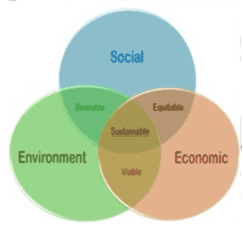Companies put one of several conceptual banners above their efforts in Green and beyond, notably corporate social responsibility (CSR) and sustainability.
Writing recently on the greenbiz.com web site, Hugh Welsh, president of manufacturing firm DSM North American, says it’s time to dump the CSR framework.
”Corporate social responsibility departments are dead - as are all the consultants, academics, conference organizations and lecturers who prey on them,” Welsh says. “We have just completed two decades of buzzwords, imitation tactics, greenwashing, PR, meaningless statistics, tomes of reports and the world is over it - they see right through all of it. Google the term "CSR" and you will see story after story stating the same thing: CSR is dead.”
Well that’s certainly a provocative view.
Welsh further argues that CEOs used to see corporate social responsibility departments as a means to mitigate risk to their company’s reputations. That often involved cranking endless reports with heartwarming stories and mind-numbing statistics to insulate the organization against any bad media, government inquiry or community concern that might come about ‘as they continued to profit from, and even extend, unsustainable business models and practices.”’
But that model no longer works, Welsh says.
“Consumers, the media, governments and even local communities demand authenticity and look at traditional CSR communications skeptically” Welsh says. “What was once an asset to the corporation is quickly becoming a liability, a cost, a casualty of an uncertain and complex world.”
He argues that companies that are still drawing a clear distinction between their business strategy and CSR strategy are behind the times.
“This is a dangerous and foolish segregation and the era of having a sustainability strategy is over: we are at the dawn of the era of sustainability as strategy,” Welsh says.
Sustainability is not just about being a good corporate citizen, Welsh argues, it is also about creating new income streams and business models.
This can be seen in everything from new approached that apply circular economic principles to government regulations such as China imposing new Blue Sky environmental laws to titans of finance such as BlackRock directing that all the companies the firm invests in engage in sustainable practices.
 Welsh cites companies such as Coca Cola and Bayer as being part of a movement toward integrated reporting and actual, measurable sustainability goals. Bayer, for example, started combining its financial and sustainability reporting in 2013 and made it clear that sustainability was established at the board level, tying with one board member now responsible for human resources, technology and sustainability. Welsh cites companies such as Coca Cola and Bayer as being part of a movement toward integrated reporting and actual, measurable sustainability goals. Bayer, for example, started combining its financial and sustainability reporting in 2013 and made it clear that sustainability was established at the board level, tying with one board member now responsible for human resources, technology and sustainability.
Coca Cola’s has a goal to safely have returned to nature an amount of water equal to what they use in production by 2020. It has reported that by 2014 it had returned about 126.7 billion liters of water used in its manufacturing processes back to communities and nature through treated wastewater.
Welsh says the public must demand that companies operate in a responsible way, else or others outside the business community - customers, consumers, fellow citizens - will enforce this on business.
Welsh concludes: “For all of those C-level executives afraid to change their business model to future-proof their companies, consider a truth from my favorite American philosopher, Fred Rogers: ‘Often when you think you are at the end of something, you are really at the beginning of something else.’”

|